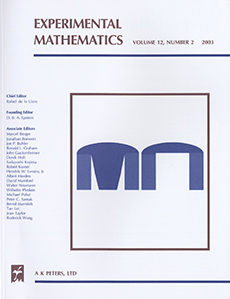Abstract
It is known that if the period s(d) of the continued fraction expansion of $\sqrt{d}$ satisfies s(d) ≤ 2, then all Newton's approximants Rn = (1/2)((pn/qn) + (dqn/pn)) are convergents of $\sqrt{d}$, and moreover Rn = p2n+1/q2n+1 for all N ≤ 0. Motivated by this fact we define j = j(d, n) by Rn = p2n+1+2J/q2n+1+2j if Rn is a convergent of $\sqrt{d}$}|. The question is how large |j| and b can be. We prove that |j| is unbounded and gie some examples supporting a conjecture that b is unbounded too. We also discuss the magnitude of |j| and be compared with d and s(d).
Citation
Andrej Dujella. "Newton's Formula and the Continued Fraction Expansion of $\sqrt{d}$." Experiment. Math. 10 (1) 125 - 131, 2001.
Information




